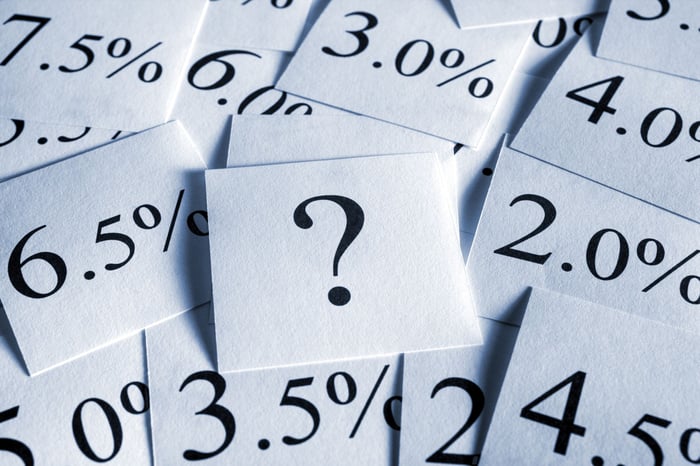Dividend investors are always on the lookout for a stock with a juicy dividend yield. The problem is that a high yield alone isn't a good enough reason to justify an investment in a company. In fact, a high yield can be a warning that a dividend isn't sustainable. When it comes to Devon Energy (DVN -0.51%) and its lofty 9.2% yield, investors looking to produce a consistent income stream from their portfolios need to tread with caution.
Policy matters
Devon Energy is a well-respected oil and gas producer with sizable operations in the continental United States. It is not a poorly run business, and nothing in this article is meant to suggest that it is a bad company. And yet, the stock's yield is huge compared to other investment options in the energy sector. For example, ExxonMobil (XOM 1.12%) and Chevron (CVX 0.34%) sport yields of just 3% and 3.5%, respectively.

Image source: Getty Images.
These are very different businesses from Devon. However, for a dividend investor looking to maximize the income their portfolio generates, adding as much as six percentage points of yield is a very attractive proposition. But there's a key difference that you need to understand before you choose Devon Energy. Exxon and Chevron have provided investors with annual dividend increases for 41 years and 36 years, respectively. Devon Energy's dividend history isn't nearly as good (more on this in a second).
One important factor here is the nature of the energy sector, which is highly cyclical. Energy price volatility, often featuring dramatic price swings, is the norm, not the exception. Exxon and Chevron have specifically built their businesses to provide reliable dividends, which include diversification across the industry (from drilling to processing) and rock-solid balance sheets. This combination provides them the wherewithal to survive the inherent ups and downs of the energy industry while continuing to reward investors with rising dividends.
Another cut is coming
Devon Energy just doesn't have the same business model. For starters, it is focused on energy production, which means that oil and natural gas prices are, basically, the sole determinant of the top and bottom lines. And second, it currently has a variable dividend policy, which is meant to provide a larger reward to investors during times of high energy prices. To put some numbers on that, the dividend increased from $0.35 per share per year in 2019 to $0.68 in 2020, $1.97 in 2021, and $5.17 in 2022.
That's some ride! But in cyclical businesses, what goes up sometimes comes down. The quarterly dividend peaked at $1.35 per share in 2022 and has now been reduced for two consecutive quarters. The first quarter 2023 dividend stood at $0.89 per share. The way dividend yields are calculated by online quote services (normally annualizing the last dividend) really isn't set up to handle dividends specifically structured to change each quarter. In other words, the dividend backing the fat yield listed for Devon Energy isn't going to last.
In fact, the company's own numbers suggest another lower payout, perhaps even in the second quarter. For example, Devon's average realized price for oil in the fourth quarter of 2022 was roughly $82 per barrel (before hedges). So far in 2023, key U.S. oil benchmark West Texas Intermediate crude has ranged between roughly $70 and $80 a barrel, a notable step lower than Devon's realized price in the final stanza of 2022.

WTI Crude Oil Spot Price data by YCharts.
That suggests that Devon Energy's realized oil price is likely to dip again in the first quarter, which will impact revenues and earnings in a negative fashion. That's not a knock on Devon; it's just how the industry works and how Devon has set up its payout policy. And if Devon does earn less, as seems likely, then the dividend is going to get cut. Again, not a knock on Devon; that's just how its dividend is currently designed to operate.
Not right for most dividend investors
As already stated, Devon Energy is not a bad energy company. And you could argue that the oil focus above doesn't fully address the scope of what Devon does, given that it also produces natural gas. However, the energy sector has definitely cooled off since commodity prices peaked in 2022, and that is flowing through to Devon's business and dividend. If you are looking for a reliable dividend payer, Devon Energy just isn't a great option because, given its current dividend policy, it isn't designed to produce consistent dividends.





